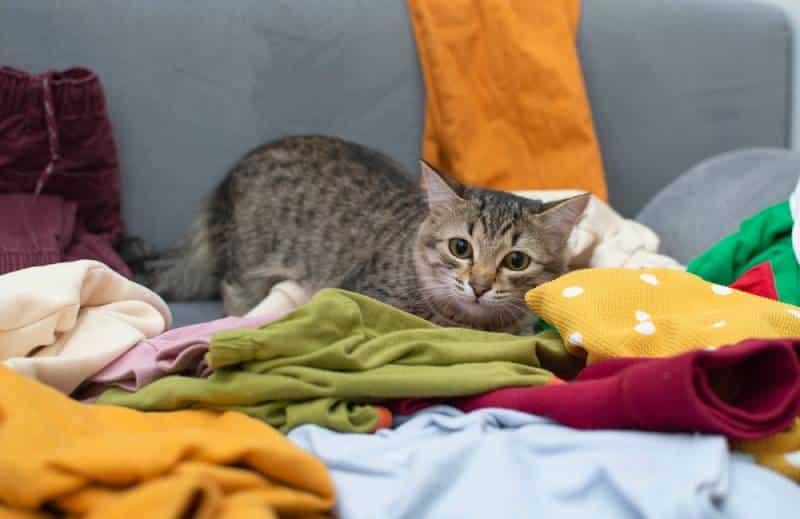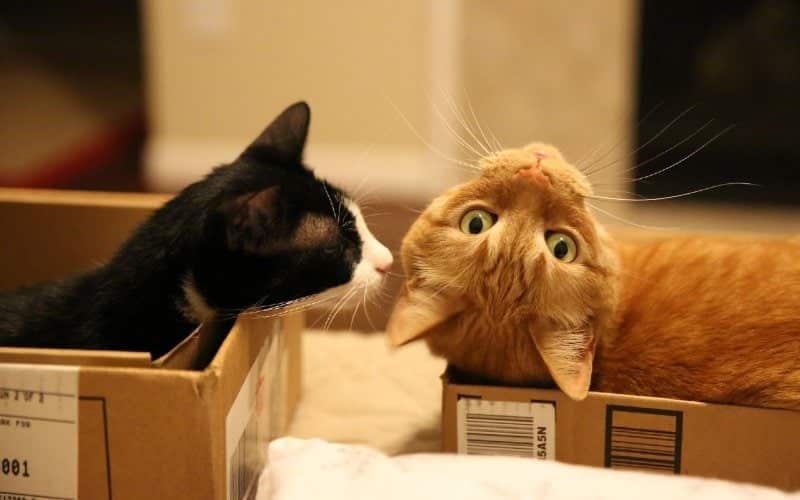There’s no shortage of cats in clothing on Instagram. Search for that term, and you’ll find cats in everything from holiday costumes to hoodies to aviator outfits.
But do cats like wearing clothes? No. Most felines will hate wearing clothes—big time. They may put up a fight as you’re trying to wrangle them into a sweater or simply mope around after they’ve been dressed up. So, if your cat hates clothing, is it ethical to keep dressing them up?
Here’s a closer look into the ethics of dressing cats!
Do Cats Like Wearing Clothes?
Our feline friends will greatly dislike wearing clothing, and honestly, they have some pretty good reasons for hating clothing (which we’ll look at below). Of course, this won’t be the case for all cats, as every cat is an individual. But even if your pet is okay with wearing clothing, dressing them up might not be the best idea.

Disadvantages of Clothing on Cats
There are several disadvantages to felines wearing clothing, some of which you may not have considered.
1. Hazardous to Their Health
Felines might sleep a lot, but they’re incredibly active when they aren’t sleeping. They are highly athletic, making wild leaps and bounds everywhere. Put them in a sweater or a costume, and suddenly, your pet’s range of motion has been limited. Your pet might not realize this right away, but they’ll find out when they try to jump from the top of the bookshelf down to something lower and end up falling. That athleticism and active nature can also mean that clothing gets stuck on things (like the hood of a shirt getting stuck on the edge of a table), which can end up, at the least, freaking your cat out or, at worst, strangling them. And if clothing somehow inhibits the kitty’s senses, there’s also a greater risk of an accident.
There are other risks, too. If you dress the kitty up in a sweater that has buttons or a costume that has bells—any sort of clothing containing any embellishments—there’s always a chance the embellishments could fall off, and the kitty could try to eat them, which poses a choking hazard. Even if your cat manages to swallow the embellishment without choking, there’s still the possibility of it becoming lodged and causing gastrointestinal blockage that can be life-threatening.
Finally, if your cat has a thick coat of fur and you put them in a sweater—even if it’s chilly out—they could still become overheated. That coat of fur keeps them pretty warm, so extra layers are rarely needed!
2. Uncomfortable
Even if the clothing were perfectly safe for cats, it would still be uncomfortable for them. Felines simply tend not to feel comfortable in clothing for various reasons. There’s fabric rubbing against them or sleeves around their legs that feel constrictive; it just isn’t ideal for your pet.
Many costumes for cats are made with fabric and materials that aren’t necessarily top-quality, which means they can be itchy or harsh against kitty’s skin. Items that have hoods might be irritating against your cat’s ears or make too much noise for their sensitive hearing, or the collar of a shirt might feel too tight around the neck.
All in all, it adds up to your cat experiencing discomfort and wanting to get out of any article of clothing immediately.

3. Stressful
Cats thrive on routine and don’t appreciate changes or new things. They can become stressed from a change in the household, a change in their food, or having clothing or a costume put on them. Think back to a time when your kitty had to wear a cone of shame; your cat was probably stressed beyond belief while wearing it, right?
Our feline friends aren’t used to wearing things, so putting clothing, costumes, collars, and the like on them can make them feel restricted and trapped. Feeling like this can result in your pet scratching at clothing to get out (and possibly getting claws ensnared in the process), hiding, or becoming listless.
Nobody should be put through that kind of stress, least of all your beloved kitty!
4. Potential for Conflict
If you have multiple cats, having them wear clothing could cause conflict between them. Why would that happen? Well, cats have a fantastic sense of smell, so they smell much more than humans do, and by putting clothing on your cat, you’re smothering them in a new, strange smell. This can be off-putting for the cat wearing the clothing, but it also makes them smell off to any other feline in the home, which could cause conflict.
Or if the cat wearing clothing gets upset by how they now smell or how the clothing feels, they might lash out at others in the home, including other felines, which could lead to a fight.

Should Cats Ever Wear Clothing?
Though felines should go without clothing for the most part, there are times when a cat might need to be dressed in something.
The most obvious instance where it is suitable to put a cat in clothing is after surgery. Not all cats do well with the cone of shame, and some cats are small enough that a cone won’t fit them. So, a surgical suit or a t-shirt can help keep them from pulling at stitches.
The other instance where your feline could benefit from clothing would be with hairless cats, such as the Sphynx. These kitties don’t have the cozy fur coats that most cats have, so they have more trouble staying warm, which means a sweater can be beneficial. This holds true for senior cats, too, as they sometimes have difficulty regulating their body temperature.

Final Thoughts
Most cats greatly dislike wearing clothing, so it’s best not to put your pet in them. Even if your favorite feline does not put up a fuss about getting dressed up, costumes and clothing still aren’t the best idea for them. Clothing can pose risks for cats, make them stressed, cause discomfort, and possibly cause conflict in multi-cat households.
There are other ways to take a fun photo with your cat. Placing them in front of a creative backdrop is one idea. Using the filters on your phone can add some creativity and humor to the final product. These are safer photo options.
- See also: Should I Dress My Cat Up For Christmas?
Featured Image Credit: miss.lemon, Shutterstock











